
How Can You Improve the Quality of Your Drinking Water?
The water in North Carolina is deemed to be safe for human consumption, yet there are areas of this beautiful state where the water is considered to be hard. And for homeowners with hard water, a water-softer installation may be just the answer. What is hard water?
Hard water is water that has a high level of dissolved calcium and magnesium. And while it isn’t any danger for consumption, there are some annoying results of hard water that a water softener installation can overcome, such as:
- Mineral buildup on plumbing fixtures
- Detergents, shampoos, and soaps do not rinse
Why does this happen? Because water is a good solvent that easily collects impurities.
What are the cons of hard water?
Maybe you’re experiencing some of these things we’ve listed (probably all of them if you have one), but you can’t afford a water softener installation. What are the cons of long-term exposure to hard water? There are 6 negative effects when hard water is for a long period:
1. Scale Buildup
Your plumbing fixtures and appliances will have scale buildup from the hard water mineral deposits. Not just the bath, shower, sinks, and tub fixtures, but your coffeemaker and dishwasher will accumulate a buildup.
2. Dry Hair and Skin
Hard water has an excessive amount of calcium and magnesium, so when you bathe, shower, or wash your hair, the shampoo or soap does not rinse off completely. This leaves your hair feeling slimy and your skin dry, and neither the shampoo nor soap has nourished your hair or skin, which can lead to brittle hair and chapped skin.
3. Clothes Faded
Hard water will strip the color from your clothes, and even make your bedding, clothing, and towels feel rough and scratchy. A water softener installation can help you save on replacing bedding, clothing, and towels.
4. Bathtub, Shower, and Sinks Get Stained
Hard water leaves a mineral residue that will stain the bathtub, shower, and sinks.
5. Plumbing Repairs
Not only are the minerals where you can see them on appliances, dishes, and fading your clothes, but they are also damaging the pipes by corroding them on the inside, which will lead to broken pipes.
6. Water Bill Increases
As the buildup of calcium and magnesium keeps accumulating inside the pipes, the water flow is decreased, and this makes the plumbing work harder. As the water is forced through, it can cause the pipes to crack and start leaking.
Is a water softener installation a whole house system?
A water softener installation can be a whole-house filtration system, ideal where the hard water results in damage and scaling throughout the home. However, if your entire home isn’t being affected by the hard water, you can have a smaller water softener installation in specific point areas of your home, like under the sink, at the washing machine, or at a shower/tub combination.
Can I do my own water softener installation?
You can do your own water softener installation, which will save you some money. Start by doing extensive research, asking for the opinions of people who have a water softener installed already. The installation is fairly straightforward and there are multitudes of videos online to walk you through the process.
However, having your water softener installation done by a professional will give you a guarantee on the work. In addition, water softener manufacturers may not honor their warranty if you do you own installation.
How much does a water softener installation cost?
To have a water softener installation done professionally, you can expect to pay an additional $500 or more on top of the cost of the water softener device. Again, this comes with a guarantee and the warranty will be honored by the water softener manufacturer.
Can you drink softened water?
Softened water is safe to consume, but when you have a salt-based water softener installed, you will have an increase in sodium. Higher sodium has been related to several health issues like diabetes, heart disease, and stroke. Any person with these health issues should consider a water softener installation that isn’t a salt-based system.
How long do water softeners last?
With proper installation and maintenance, a water softener installation can have a lifespan of up to 15 years. If your water softener unit requires frequent repairs or becomes worn out, you may need to revisit your maintenance practices.
Before Adding Water: Ask If A Water Softener Installation Is Worthwhile?
This is a personal decision but consider your home’s water hardness as a starting point. If it at 7 GPG or higher, than you could definitely benefit from a water softener installation. If you’re having concerns about dry hair, scratchy skin, or appliance and plumbing problems, consider a water softener installation, either a whole-home setup or a direct point system. You can give us a phone call at 828-778-2425 now for a water softener installation in Hendersonville, Mills River and Asheville, NC.





